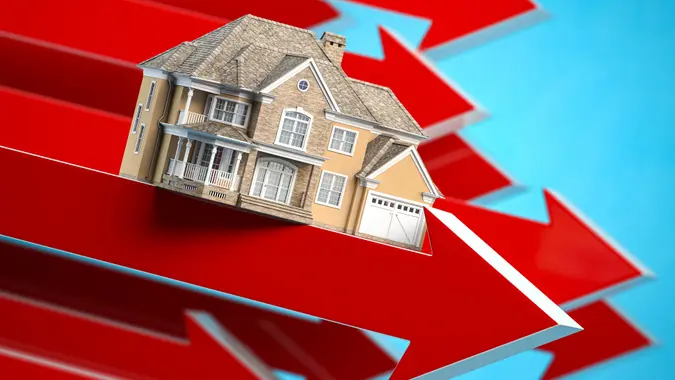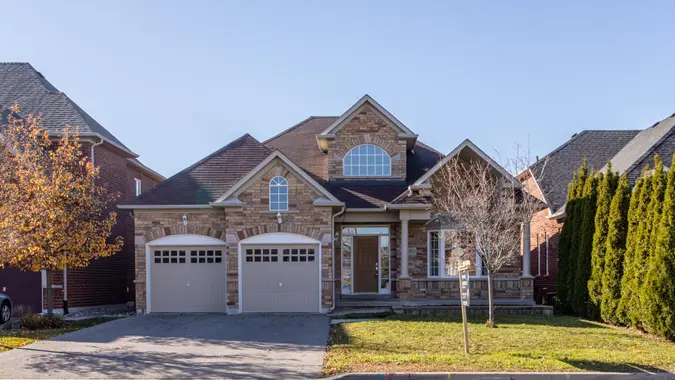How to Successfully Make an Obscenely Low Offer on a House

Commitment to Our Readers
GOBankingRates' editorial team is committed to bringing you unbiased reviews and information. We use data-driven methodologies to evaluate financial products and services - our reviews and ratings are not influenced by advertisers. You can read more about our editorial guidelines and our products and services review methodology.

20 Years
Helping You Live Richer

Reviewed
by Experts

Trusted by
Millions of Readers
Of all the things that got more expensive in 2021, inflation hit the housing market harder than just about any other section of the economy. The year was defined by high demand, low supply, intense bidding wars, and above-list sale prices.
That’s not exactly the kind of environment where buyers have the leverage to demand bargain-basement prices. Even so, those with a strategy and an eye for opportunity can always find sellers who are willing to go low.
But that doesn’t mean you can just make an offer of 20% off the asking price and expect success, according to Lucas Machado, president of House Heroes LLC.
“At the end of the day, the homebuyer and home seller need to settle on price and terms that work for everyone involved,” said Machado. “If that’s achieved, all parties walk away happy. If that isn’t achieved, no home sale will ever occur.”
To better ensure you get the home you want for a dream price, follow these six steps from the experts.
1. Do Your Research Before House Hunting
In the end, success or failure in house hunting depends not on skill, instincts, or luck. Success depends on research. Here’s what you need to know to avoid wasting your time writing offers to sellers who will only take top dollar.
Know the sellers
You need to know the seller’s reason for selling, according to Mindy Jensen, podcast host, author, and community manager at BiggerPockets.com, a real estate social network and marketplace.
“If they are trying to make the most money they can to take advantage of a hot market, your low-ball offer has almost no chance of being accepted,” Jensen said.
She went on to say that if the home was inherited, there are out-of-state owners, or they’ve tried and failed to sell the home previously, this might be a green light to a low-ball offer, she said.
Know the market
Do a lot of research on comparable properties in the area and what they sold for — and trust your findings more than the seller’s asking price.
“Listing prices vary widely from extremely overpriced to well below market value,” said Machado. “Homebuyers — either through their own research or working with a knowledgeable local professional — should understand the value of a property and offer according to that value.”
Know the property
A good strategy is to look for a property that needs some attention and care, has been on the market for months, or is distressed. Karim Wahba of Wahba Group Real Estate had clients who didn’t mind lending a little blood, sweat and tears to fixing up a property if the price was right. He used this fact to find them a deal.
“I made it known to the other agent that there is a lot of work that needs to be done to the home,” Wahba said. “I also made it clear to him that they were not in love with this home in particular, that they were considering several other options that did not need much work done to them. So I always made him feel that if the price is not right, they will choose the easier option and buy a home that was move-in ready.”
In the end, the seller saw his points were reasonable and accepted an offer well below the asking price.
2. Use Cash When Buying a House
Making an all-cash offer is about as enticing to a seller as it gets, said Than Merrill, host of A&E’s “Flip This House” and CEO and co-founder of the real estate investment education company FortuneBuilders.
“If you plan to make an extremely low-ball offer, like 25% less than the asking price, you might want to consider using cash to cushion the cheap bid,” Merrill said.
There are a few reasons this could work, from a seller knowing that all cash usually means a fast closing to the fact that financed offers often fall through at the last minute, he said. Obviously, not everyone can come up with an all-cash offer, so you should at least do the next best thing and get fully pre-approved.
“Other terms that can be modified to improve the chances are paying closing costs and reducing the length of the inspection period,” said Machado.
3. Work With a Realtor When You’re House Hunting
When buying a home, professional help is worth the expense — a good realtor’s commission more than makes up for itself in the experience you’ll gain.
“A realtor can pull comps in the area to help you determine how low you can really go,” said Merrill. “It doesn’t matter what other homes in the area [were] listed for. It matters what they sold for.”
For instance, Wahba, the realtor who successfully negotiated a low offer for his clients, discovered that the sellers had unsuccessfully tried to sell the property in question a year before, so they were highly motivated. Also, through his experience, Wahba was able to gauge the amount of work that would be needed and suggest good contractors for estimates. In the end, $20,000 worth of TLC resulted in $30,000 worth of equity.
4. Use Rhetoric and Flattery
Merrill said a well-crafted offer letter goes a long way to soften the blow a low-ball offer can sometimes deliver.
“Start with a little flattery and pitch to the seller’s emotional side,” Merrill said. “The fact of the matter is that the seller needs to like you to accept your offer.”
Compliment them, compliment the home, compliment yourself, Merill Continued.
“You also might want to consider highlighting the similarities you have with the seller,” he said. “Calling attention to your similarities with the seller will create a personal connection and give you an edge over the competition.”
5. Give the Seller Reasons for Your Reduced Price
If you are going to make a low-ball offer, you’d better be ready to back up your reasoning with facts, according to Merrill. Is the market cold? Has the home been on the market for more than 30 days? Are there inherent damages to the home? These are all good things to point out if true, said Merrill.
“It is worth it to spend a little extra money on a highly seasoned inspector,” Merrill said. “A professional inspector will scrutinize every corner of the home until he or she finds a problem that might help to justify a low-ball offer. If you’re able to uncover something the seller may have been trying to hide, they won’t have any choice other than to take your offer.”
6. Be Reasonable With the Seller
Put yourself in the seller’s shoes when making an offer or negotiating. Understand that they want a fair price just as much as you want a great deal, so the goal is to make sure you both feel satisfied.
“You want to avoid offending the seller with an extreme low-ball offer,” said Merrill. “So, it is important not to put forth an offer that is outrageously below the asking price.”
This is especially true for properties that are in good shape and priced fairly.
“If a homeowner just spent thousands of dollars on repairs and renovation, the homeowner will not be keen on agreeing to a reduced price,” said Machado.
And frankly, you probably shouldn’t expect them to.
Look for words like “pristine,” “beautiful,” or “immaculate,” in property listings.
“Those words or their synonyms indicate a property is premium and a buyer is unlikely to get a substantial reduction,” Machado said.
Don’t Give Up on Buying a House
Getting a great deal can take a lot of time and a lot more patience. If not, everyone would be scoring — and sometimes, that patience needs to extend beyond the negotiations, said Jensen.
If you and the sellers can’t agree on a price, Jensen advised asking them to keep your contact info — but be sure to keep your eye on the property.
“I once put a low-ball offer in on a bank-owned condo,” Jensen said. “They did not accept it, and we stopped watching the property. It sat for months, eventually selling for far less than what I had originally offered.”
A Good Low-Ball Offer Works for Both Buyer and Seller
Done properly with care, understanding, and intelligence, making a low-ball offer can not only work out for you, but the seller as well. A good example comes from Dr. Judy Martin, an author and veterinarian in New Jersey.
Martin found a home she loved on the market for $475,000. This was the price after the home had been on the market for eight months and had been reduced from $499,000. Martin did her research and found comparable homes in the neighborhood that had sold for much less. So she made an initial offer of $375,000, explaining her reasons for the low offer.
“I explained that [although] I thought this home was clearly worth the higher price in a different neighborhood, the price was not in line with the location,” she said.
She also told the seller that she had a second house she was interested in if they didn’t want to come down in price. The sellers saw her point and countered with $400,000. A deal was struck at $385,000 and most importantly, both parties walked away happy.
More From GOBankingRates
 Written by
Written by  Edited by
Edited by 

























